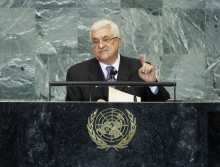Well, that didn’t take long. Nine months after new peace talks were launched between Israel and the Palestinians, the Palestinians managed to not only put up a roadblock to extending the talks, but appear to have killed them for the foreseeable future. “Peace partners” don’t sign unity deals with terrorists, and so away went the peace option when the “moderate” Palestinians proposed to reconcile with Hamas.
People were quick to point out that the Palestinian faction Fatah, led by President Mahmoud Abbas, has tried to re-unite with Hamas before and it’s failed every time. But this time, it really looks likely, and that’s the end of the real peace process for now. It may also lead to a new round of violence or even war.
The first real clue that the unity deal with Hamas could actually work came when security forces discussions didn’t derail the process. The Palestinians under Abbas have long been working and training with the Americans and the Israelis to fight terrorists—including Hamas. What’s more, Hamas has a sizable security force of their own that forms the backbone of their terror machine. Surely these two opposing forces couldn’t coexist, right?
Well, it looks like they just might. Hamas has repeatedly stated they want their miniature army to continue, and for now it certainly appears that it shall. But even as those statements were made, Fatah didn’t balk and walk away.
Then, the big moment came: In mid-May, Hamas Prime Minister Ismail Haniyeh was quoted by the Ma’an News Agency as saying they had reached a deal with Fatah for handling the security forces. What that ultimately will look like, and whether or not the two forces ever truly coexist, is uncertain.
But that it wasn’t used as a red line or an excuse to back out of the unity deal demonstrates the sincerity of the reconciliation.
It also could prove to be the powder keg that starts a new war.
In those same comments, Haniyeh refused to give up the “weapon of resistance,” also known as violence against Israel. While Fatah has long worked with Israel, this deal could end that cooperation, leading to a new influx of terrorists into the heart of Israeli territory.
Gaza is off to the side, far enough away from Israel’s central cities, so that Hamas had limited abilities to threaten Israel’s capital of Jerusalem or its economic hub of Tel Aviv.
But if Hamas gains access to the West Bank, which had been prevented them by both Israel and Fatah, then they would be able to reach virtually anywhere in Israel with rockets and have easier access to Israeli towns and cities for suicide bombers. It’s really bad news.
And what if Hamas attacks Israel? Isn’t Fatah then responsible too? Suddenly it’s a real terror war all over again, not just a heated skirmish with Gaza. The stakes will be much higher than before.
Similarly, the unity government has always been a hindrance to Palestinian unity as well, but statements from Palestinian officials to Ma’an have sounded optimistic that genuine efforts to form a new cabinet are underway. Even some leftist groups have complained to Ma’an that their partnership in that process is too small—another sign that Hamas and Fatah are actually talking real details.
This could kill the Palestinian economy, because a unity government with Hamas—who continues to deny Israel’s right to exist and espouses violence—will find a hard time getting financial aid from the Americans. That’s an expensive unity deal.
What’s more, it makes peace talks ludicrous. Abbas has claimed that a separate Palestinian entity, their quasi-government group that handles international relations, could still talk with Israel. But what authority would it have? And isn’t it hypocritical to align with terrorists on a day-to-day basis and then talk peace at night?
Israel can’t and shouldn’t trust Abbas in such a scenario.
And so it comes, the end of an era. Even fake peace talks won’t make sense after the deal is signed between Hamas and Fatah. Finally, the true face of the Palestinians will be on display every day.
Seven years ago, the violent split of Fatah and Hamas offered a chance for peace with Israel. Today, however, it’s peace between Fatah and Hamas that seems the most likely. And that peace with terrorists means an end to the real peace process.
(By Joshua Spurlock, www.themideastupdate.com, May 23, 2014)

